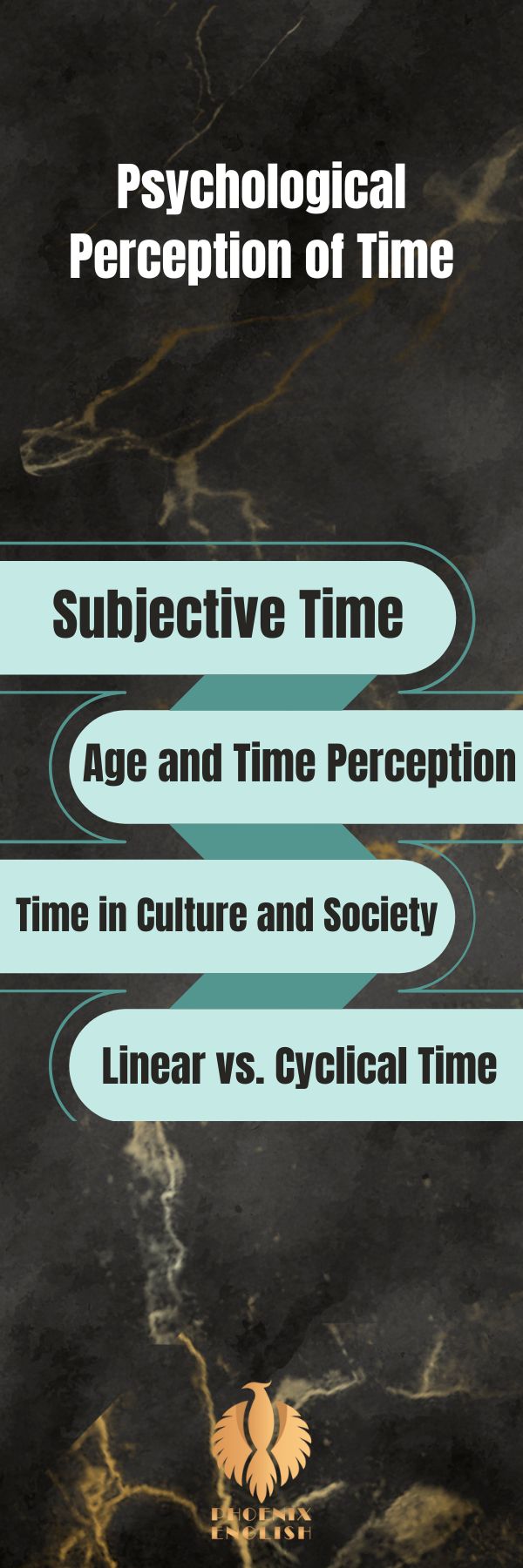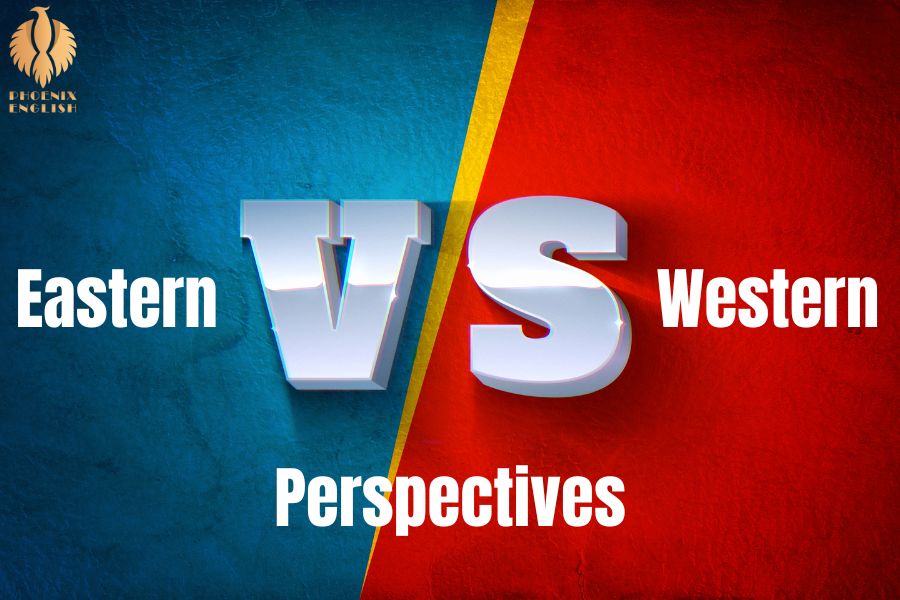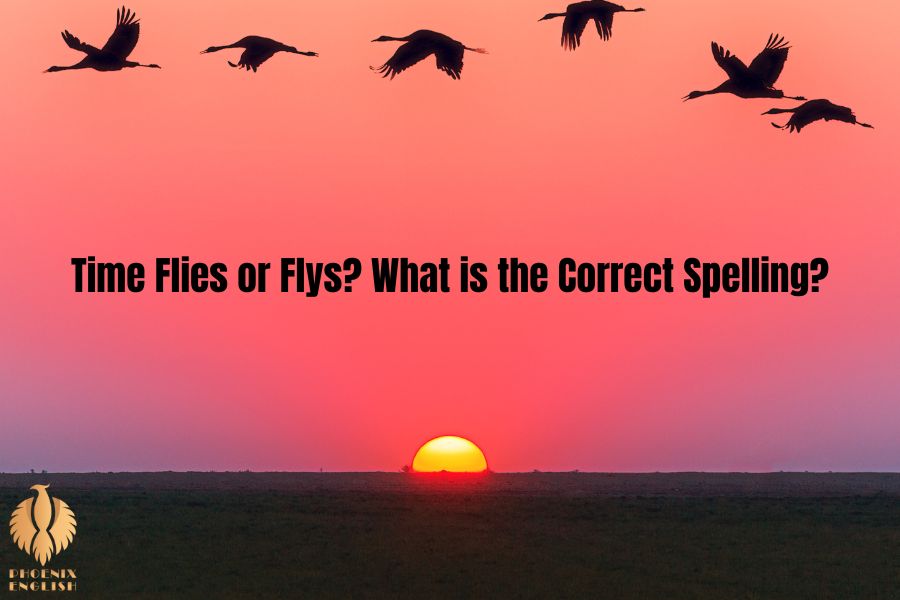I’ve always found the English language to be full of nuances, idiomatic expressions, and rules that often seem to have exceptions. This makes it both fascinating and, at times, perplexing.
One phrase that has always intrigued me is time flies.
I’ve often heard people question whether the correct spelling should be time flies or time flys? Of course, time flies is the correct form and we should always use this form in our English.
To clear up any confusion, let’s delve into the origins, usage, and grammatical rules surrounding this expression, exploring it in depth.
You might also enjoy: Top 100 Commonly Used Verbs That Start With B [2024]
Origins of Time Flies
The phrase time flies is a shortened form of the Latin phrase Tempus fugit, which translates to time flees or time escapes.
This Latin proverb is used to express the idea that time passes quickly, especially when one is engaged in enjoyable activities or reflecting on past events.
The Latin phrase has been in use since ancient times and was popularized in English literature during the 16th and 17th centuries.
When I first encountered this phrase, I was struck by the imagery it evoked.
Time, depicted as something that can fly away, felt like a poetic way to describe how moments slip through our fingers, especially during joyful or meaningful experiences.
Correct Spelling: Flies
The correct spelling of the phrase time flies is indeed flies.
This can be confirmed by understanding both the grammatical structure of the phrase and the rules governing verb conjugation in English.
Verb Conjugation

Flies is the third person singular present tense form of the verb to fly. In English, verbs typically change their form based on the subject and tense. For example:
● I fly
● You fly
● He/She/It flies
● We fly
● They fly
In the phrase time flies, the subject is time, which is a singular noun. Therefore, the verb must also be in the singular form, which is flies.
Common Mistake: Flys
I understand where the confusion might come from. The word flys is a common misspelling and does not exist in standard English. The mix-up often arises from the plural form of the noun fly, which refers to the insect.
The correct plural form is flies, not flys. As someone who has made this mistake myself in the past, I can see how easily English speakers and learners might mistakenly apply this incorrect spelling to the verb form, leading to erroneous time flys.
Usage in Context

Using time flies correctly in context helps reinforce why flies are the appropriate form.
The expression is used to convey the swift passage of time, often in a figurative sense. Here are some examples:
● Time flies when you’re having fun.
● It’s hard to believe that it’s already June. Time flies!
● Looking back at old photographs, I realize how quickly time flies.
Each of these examples correctly uses flies to convey the idea of time passing swiftly. Whenever I use these examples in conversation, they resonate deeply with the listeners, often evoking a sense of nostalgia or a moment of reflection.
Grammatical Structure
The phrase time flies follows a simple subject-verb structure, where time is the subject and flies is the verb. This straightforward construction emphasizes the action being performed by the subject, which in this case is the rapid passage of time.
Exploring the Concept of Time in Language
The expression time flies is not just a linguistic curiosity but also a reflection of how we, as humans, perceive and describe the passage of time.
It’s fascinating to explore how different cultures and languages encapsulate the concept of time and how this affects our understanding of expressions like time flies.
Cross-Cultural Perspectives

Different languages have unique ways of expressing the passage of time, often influenced by cultural perceptions and experiences.
Spanish: El tiempo vuela
In Spanish, the equivalent of time flies is el tiempo vuela. Here, vuela is the third person singular form of the verb volar, which means to fly. The construction is similar to the English phrase, emphasizing the rapid passage of time. Whenever I speak with my Spanish-speaking friends, I find it interesting how seamlessly this metaphor translates across languages.
French: Le temps passe vite
In French, the expression time flies is conveyed as le temps passe vite, which translates to time passes quickly. Although the verb voler (to fly) exists in French, the phrase uses passe (passes) to express the swift passage of time. This slight variation highlights the cultural differences in how we describe the same phenomenon.
German: Die Zeit vergeht schnell
In German, time flies is translated to die Zeit vergeht schnell, meaning time passes quickly. Again, the focus is on the quick passage rather than the metaphor of flying. I find it fascinating how the essence of the expression remains intact, despite the different linguistic approaches.
These examples show that while the metaphor of flying is prevalent in English and Spanish, other languages use different verbs to convey the same concept, reflecting varying cultural metaphors and perceptions of time.
The Role of Idioms and Metaphors
Idioms and metaphors play a significant role in language, allowing speakers to convey complex ideas in concise, imaginative ways.
Idiomatic Expressions

A phrase or term that defies literal interpretation of its constituent words is called an idiom. Time flies is an idiomatic expression that uses the metaphor of flying to describe how quickly time seems to pass. I often marvel at how idioms can convey such rich meanings in just a few words.
Metaphorical Thinking
By using metaphors, we can experience and comprehend one thing through the lens of another. In time flies, time is metaphorically given the ability to fly, suggesting rapid movement and the elusive nature of time.
This metaphor captures the human experience of time slipping away, especially during moments of enjoyment or reflection. I find this metaphor particularly powerful because it vividly captures the transient nature of our experiences.
Historical Evolution of the Phrase
Understanding the historical evolution of the phrase time flies provides insight into its enduring relevance and usage in modern language.
Early Literature
The concept of time passing swiftly has been a theme in literature for centuries. The Latin phrase Tempus fugit appears in many classical texts, reflecting ancient concerns with the fleeting nature of time.
I find it fascinating how this concept has transcended centuries and remains relevant today.
Renaissance and Enlightenment
During the Renaissance and Enlightenment periods, the phrase time flies and its variants became more common in English literature. Writers and poets used the expression to highlight the transitory nature of life and the urgency to make the most of one’s time.
For instance, in the early 17th century, Robert Herrick’s poem To the Virgins, to Make Much of Time famously begins with the lines:
Gather ye rosebuds while ye may, Old Time is still a-flying. Reading such literature, I feel a connection to the past, recognizing that the fleeting nature of time has always been a poignant theme for humanity.
Modern Usage
In contemporary usage, time flies remains a popular and relevant expression. It is frequently used in everyday conversation, literature, and media to convey the swift passage of time. I often hear this phrase in various contexts, from casual chats to profound reflections, underscoring its timeless nature.
Time and Human Experience
The expression time flies resonates deeply with the human experience of time. Time perception is a complex psychological phenomenon influenced by various factors, including age, emotions, and activities.
Psychological Perception of Time

Subjective Time
Humans perceive time subjectively, meaning that our experience of time can vary depending on circumstances.
For example, time may seem to slow down during periods of boredom or stress, while it appears to speed up during moments of excitement or joy. I’ve noticed this in my own life, where a fun weekend seems to vanish in an instant, while a dull meeting feels interminable.
Age and Time Perception
As people age, their perception of time tends to change. Children often feel that time passes slowly, while adults frequently experience time as moving more quickly.
This shift in perception is thought to be related to the proportional theory of time, which suggests that as we grow older, each year represents a smaller fraction of our total life, making time seem to accelerate. Reflecting on my own childhood, I remember summers feeling endless, whereas now, months seem to blur together.
Time in Culture and Society
Cultural attitudes toward time also shape how we perceive and talk about time. In some cultures, time is viewed as a linear progression, while in others, it is seen as cyclical.
You might also enjoy: Top 100 Commonly Used Verbs That Start With D [2024]
Linear vs. Cyclical Time
In Western cultures, time is typically perceived as linear, with a clear beginning, middle, and end. This perspective is reflected in expressions like time flies, which imply a forward motion.
In contrast, many Eastern cultures view time as cyclical, with repeating patterns and cycles. This cyclical view is often reflected in language and cultural practices, emphasizing the continuity and repetition of time.
I find it enriching to compare these perspectives, as they offer diverse ways of understanding our existence and the passage of time.
Misconceptions and Common Errors

Despite the clarity of grammatical rules, misconceptions and common errors about the phrase time flies persist. Understanding these can help prevent mistakes and enhance language proficiency.
Flys vs. Flies
As previously mentioned, flys is an incorrect spelling. The error likely arises from confusion between the plural form of the noun fly (the insect) and the verb to fly.
Noun and Verb Confusion
In English, many words can function as both nouns and verbs, but their forms may change. Recognizing the distinction between these forms helps avoid errors like time flys. I recall making this mistake in my early writing and feeling a bit embarrassed once I realized the error.
Similar Idiomatic Expressions
Other idiomatic expressions involving time can also cause confusion. For instance:
● Time passes – highlights the passage of time.
● Time drags – Suggests that time moves slowly, often used in negative contexts.
● Time stands still – Implies a moment when time seems to pause, often due to a significant event.
Understanding these expressions and their proper usage enhances overall language comprehension. I enjoy exploring these nuances as they add depth and variety to our conversations.
Time in Literature and Media
The phrase time flies and its various interpretations have been widely explored in literature, film, and other forms of media, offering rich insights into the human condition.
Literary Works

Many literary works have poignantly addressed the swift passage of time. In addition to Robert Herrick’s poem, we see similar themes in works like Shakespeare’s Sonnet 18, where the poet reflects on the enduring nature of art compared to the fleeting nature of time.
I find it inspiring how writers use their
craft to immortalize moments and ideas, countering the relentless march of time.
Film and Media
Film and media also reflect on the concept of time flying. Movies like Inception and Interstellar explore time’s elasticity and its impact on human relationships.
In Inception, the idea of dream time versus real-time creates a complex narrative that leaves audiences contemplating the nature of time itself.
Interstellar uses the theory of relativity to show how time can pass differently in various contexts, affecting lives and choices. These films fascinate me as they visually and narratively explore the complexities of time, making abstract concepts tangible and emotionally resonant.
Personal Reflections on Time Flies
Reflecting on my own life, I often find myself saying, time flies, especially during moments of nostalgia. It’s a phrase that comes naturally when I look back at significant milestones or think about how quickly my children are growing up.
I remember my parents and grandparents using it, and now it has become a part of my own vocabulary. It’s a reminder to cherish each moment because, before you know it, the present becomes the past.
Childhood and Time Perception
As a child, I remember summer vacations feeling like they lasted forever. Days were long and filled with endless possibilities. Each event felt significant and stretched out in my memory.
Now, as an adult, I find that months and years seem to fly by. This shift in perception, where time appears to speed up as we age, is a universal experience that underscores the expression time flies.
Busy Adult Life
In my busy adult life, balancing work, family, and personal interests, I often feel like there aren’t enough hours in the day. Weeks blend into months, and before I know it, a year has passed. This rapid passage of time can be both exhilarating and daunting.
On one hand, it’s a sign of a life filled with activities and responsibilities; on the other, it can make me acutely aware of how precious time is. This awareness encourages me to be more mindful and present, appreciating the small moments that might otherwise go unnoticed.
Time in Different Cultures
The way different cultures perceive and articulate the passage of time fascinates me. These cultural differences not only shape our understanding of time but also influence our daily lives and behaviors.
Eastern vs. Western Perspectives

In Western cultures, where time is often viewed as linear, the focus is on progress and forward movement. Phrases like time flies align with this perspective, emphasizing the swift, often unstoppable nature of time. This linear view can create a sense of urgency, pushing us to achieve and accomplish as much as possible in a limited timeframe.
Many Eastern civilizations, on the other hand, believe that time is cyclical. This perspective emphasizes the recurring nature of life events and the continuity of existence.
When I engage with these cultures, I notice a more relaxed approach to time, where the focus is on the present moment and the cycles of nature.
Understanding these differing viewpoints enriches my own perspective on time, providing a more holistic view of how we navigate our lives.
Time and Festivals
One of the most striking examples of cultural differences in time perception can be seen in how various societies celebrate festivals and significant events.
In many Eastern traditions, festivals are tied to lunar cycles and natural rhythms, highlighting the cyclical nature of time.
For instance, Chinese New Year, Diwali and other festivals are celebrated according to lunar calendars, emphasizing renewal and the cyclical passage of time.
In contrast, Western holidays like New Year’s Eve and Christmas are fixed on the Gregorian calendar, reinforcing the linear progression of time. These celebrations often include reflections on the past year and resolutions for the future, embodying the concept of time as a forward-moving entity.
Time and Technology
In our modern era, technology has significantly influenced how we perceive and manage time. While advancements have brought convenience and efficiency, they have also contributed to the feeling that time is slipping away faster than ever.
Digital Age and Time Perception
With the advent of smartphones, social media, and instant communication, our perception of time has changed dramatically. The constant connectivity and rapid pace of information can make us feel like we’re always racing against the clock.
Notifications, emails, and social media updates create a sense of urgency and constant engagement, making it seem like time is always flying.
I often catch myself checking the time on my phone, only to realize how quickly the hours have passed while browsing or responding to messages.
This constant digital engagement can create a paradox
where, despite being more connected, we feel less in control of our time.
Work-Life Balance
Technology has also blurred the lines between work and personal life. Remote work, while offering flexibility, can lead to an always-on mentality where the boundaries between professional and personal time become indistinct.
This lack of clear separation can exacerbate the feeling that time is flying by, as days blend into each other without clear demarcation between work hours and leisure.
To counter this, I’ve tried to implement strategies to manage my time better, such as setting specific work hours and taking regular breaks to disconnect from digital devices. These practices help create a more balanced and mindful approach to managing time.
The Psychology of Time Flies
Delving into the psychological aspects of time perception provides further insight into why we often feel that time flies.
Flow State

One concept that resonates with me is the idea of the flow state, introduced by psychologist Mihaly Csikszentmihalyi. Flow occurs when we are fully immersed and engaged in an activity, losing track of time because we are so focused.
This state of heightened concentration and enjoyment often makes time feel like it’s flying by. I’ve experienced flow while working on creative projects, where hours seem to pass in what feels like minutes.
Retrospective Time Perception
Another interesting phenomenon is retrospective time perception, where the amount of information and events that happen within a period influences our memory of how long that period felt.
Busy, eventful times might feel like they passed quickly while they were happening, but in retrospect, they seem longer because of the richness of the experiences.
Conversely, monotonous periods might feel slow at the moment but seem shorter in hindsight due to the lack of distinctive memories. Reflecting on my own experiences, I find this particularly true during vacations.
While traveling, days are packed with new sights, sounds, and activities, making them feel both fleeting and, in retrospect, densely packed with memories.
Literary and Philosophical Perspectives
Philosophers and writers have long pondered the nature of time, contributing rich perspectives that deepen our understanding of phrases like time flies.
Philosophical Views on Time
Philosophers such as Saint Augustine and Martin Heidegger have explored the concept of time in their works. Augustine, in his Confessions, famously reflected on the paradoxical nature of time, pondering how it can be measured and experienced.
Heidegger, in Being and Time, examined the existential aspects of time, emphasizing the importance of understanding our own temporality. Reading these philosophical texts, I’m struck by the depth of thought and the timeless nature of these inquiries.
They remind me that our relationship with time is a fundamental aspect of the human experience, transcending cultures and eras.
Literary Reflections
In literature, the theme of time is often explored to express the human condition. Marcel Proust’s In Search of Lost Time delves into the intricate connections between time, memory, and identity.
Proust’s reflections on involuntary memory, where a sensory experience evokes a long-forgotten memory, illustrate how time can collapse, bringing the past into the present moment. Virginia Woolf’s Mrs. Dalloway and James Joyce’s Ulysses are also profound explorations of time.
These novels, unfolding over a single day, intricately weave the character’s internal experiences with the passage of time, emphasizing the fluidity and subjectivity of temporal perception.
Engaging with these works, I appreciate the nuanced ways in which literature can capture the essence of time flying.
Embracing the Fleeting Nature of Time
Recognizing that time flies can also inspire us to live more fully and mindfully. By embracing the fleeting nature of time, we can cultivate a deeper appreciation for the present moment and the experiences it brings.
You Might Also Enjoy: Cancelled or Canceled; Spelling; Examples [2025]
Mindfulness and Presence
Practicing mindfulness has been a transformative way for me to connect with the present moment. By focusing on the here and now, I find that I can slow down my perception of time, savoring each experience more fully.
Techniques such as mindful breathing, meditation, and paying attention to sensory details help anchor me in the present, making each moment feel richer and more expansive.
Making Meaningful Memories
Another way to counter the feeling that time is flying is to create meaningful memories. Engaging in new activities, traveling, spending time with loved ones, and pursuing passions all contribute to a more memorable and fulfilling life.
These rich experiences not only enhance our quality of life but also create a tapestry of memories that make time feel more substantial in retrospect.
Conclusion
The phrase time flies is a powerful and enduring expression in the English language, capturing the elusive and swift passage of time. The correct spelling, flies, is derived from the third person singular form of the verb to fly, reflecting proper grammatical usage.
By exploring the origins, grammatical rules, cultural perspectives, psychological aspects, and literary reflections on time perception, we gain a deeper appreciation for this idiomatic expression and its significance in human experience.
In summary, the next time you find yourself marveling at how quickly a week, month, or year has passed, remember the phrase time flies and its correct spelling.
This understanding not only enriches your language skills but also connects you to a timeless metaphor that resonates across cultures and eras.
By embracing the fleeting nature of time and living mindfully, we can make the most of the moments we have, turning the swift passage of time into a journey filled with rich experiences and cherished memories.

Hi, welcome to my blog! My name is Omid and I am thrilled to have you here! I am an English language teacher with 12 years of experience and hold multiple international certifications (TESOL, IELTS, TOEFL, PTE, CELTA). Additionally, I hold a PhD in Applied Linguistics with a specialization in Teaching English as a Second Language (TESL), which fuels my passion for teaching English and assisting others in mastering the language. To me, nothing is more rewarding than helping individuals enhance their English language abilities through various methods. So, let’s embark on this journey of learning English together.




